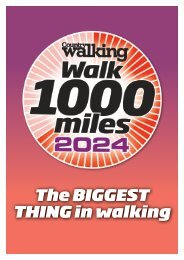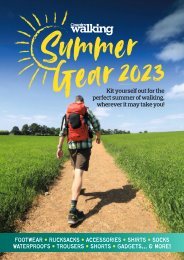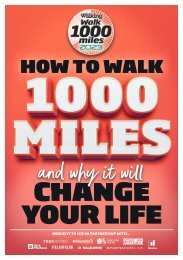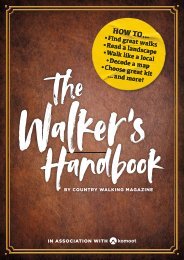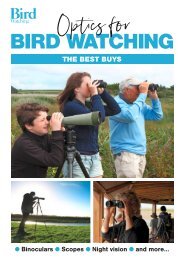Create successful ePaper yourself
Turn your PDF publications into a flip-book with our unique Google optimized e-Paper software.
<strong>Your</strong> <strong>Horse</strong> 427 july 2017<br />
Win<br />
tickets<br />
to<br />
<strong>Your</strong> <strong>Horse</strong><br />
Live<br />
take 3 friends with you & Meet charlotte dujardin<br />
go affiliated<br />
We show you how & why!<br />
l hack 1000 miles l easy ways to bond l laminitis l ride with confidence l strangles explained l inside the equine brain<br />
for people with a passion for horses<br />
july 2017 (<strong>Issue</strong> 427)<br />
10<br />
easy ways<br />
to bond with<br />
your horse<br />
Inside the<br />
equine brain<br />
We investigate memory,<br />
tumours and dementia<br />
The ultimate<br />
guide to<br />
laminitis<br />
Triggers, treatment,l<br />
feeding and morel<br />
expert advice<br />
Improve your<br />
jumping with poles<br />
What you can learn<br />
from Western<br />
Hack safely in<br />
a group<br />
confidence<br />
Ride with<br />
NEW<br />
seRies!<br />
l Manage<br />
spooking<br />
Simple techniques to help you:<br />
l Remember your<br />
dressage test<br />
l Stay calm at<br />
competitions<br />
l Cope when<br />
things go wrong<br />
Protect your<br />
horse from<br />
strangles<br />
Perfect<br />
your hand<br />
position<br />
www.yourhorse.co.uk<br />
only £3.99!
p20 Have you<br />
signed up for<br />
#Hack1000miles yet?<br />
Contents<br />
<strong>Your</strong> <strong>Horse</strong> <strong>July</strong> 2017<br />
23<br />
82<br />
92<br />
87<br />
On the cover<br />
26<br />
96<br />
57<br />
50<br />
74<br />
20<br />
Regulars<br />
6 Our horse hero Ballaseyr Royale, we salute you<br />
8 News & views The latest from the horse world<br />
12 News Report Is the internet putting horses at risk?<br />
14 Diary dates This month’s best shows and events<br />
16 <strong>Your</strong> say You get in touch<br />
18 Send a selfie You share your pics<br />
128 <strong>Horse</strong>s for sale Find your dream equine partner here<br />
133 Buying a dressage horse Tips from <strong>Horse</strong> Deals<br />
138 First-timer tales Taking on an ex-racer<br />
Better Riding<br />
42 Join the Confidence Club with Helen Rennie<br />
49 Expert workout Four exercises on one simple shape<br />
50 Schooling solutions Improve his jumping and<br />
sharpen up your reactions with pole exercises<br />
57 Find it, fix it! Perfect your hand position<br />
58 How to Clear a skinny<br />
58 Hairy Hopefuls Channel your horse’s enthusiasm<br />
42<br />
win!<br />
34. A dressage training break with a pro<br />
73. Tickets to the Festival of British Eventing<br />
113. Loads of rider clothing to give away!<br />
4 your horse july 2017
Subscribe<br />
You’ll get<br />
6 months<br />
for £23<br />
when you<br />
subscribe<br />
today!<br />
See<br />
p24<br />
p74 The team saddle<br />
up and go Western<br />
p82 Build the<br />
bond with your horse<br />
Features<br />
20 #Hack1000miles Find out how to join our epic<br />
12-month challenge and get group hacking tips!<br />
26 Find your focus Our guide to moving up<br />
a level, going affiliated and more<br />
36 Win a horse... meet the final three<br />
66 Behind the scenes at Gatcombe<br />
We reveal the inner workings of this awesome event<br />
74 We go Western See how we fared on our<br />
Western riding taster day with David Deptford<br />
<strong>Horse</strong> Care<br />
82 Bond with your horse Advice from equine<br />
behaviour pro Richard Maxwell<br />
87 A guide to laminitis The symptoms, triggers<br />
and treatment revealed<br />
96 Strangles Our vet expert explains the condition,<br />
its symptoms and treatment options<br />
92 Inside the<br />
equine brain<br />
Understanding<br />
conditions affecting<br />
our horses’ brains<br />
Ask the experts<br />
100 Eventing Tips for cross-country first-timers l Preparing<br />
for cross-country at home<br />
102 Vet advice <strong>Horse</strong>s with hay fever l Bandaging tips<br />
104 Arena surface advice Creating an outdoor arena<br />
l Problem surfaces l Deep surface management<br />
106 Management Helping a horse on box rest in summer<br />
108 Feeding The benefits of tumeric l Keeping horses<br />
hydrated l Donkey diets<br />
111 Advice from Spillers How you can help to reduce<br />
a horse’s risk of laminitis<br />
Gear Guide<br />
116 What’s new<br />
The latest gear<br />
118 Put to the test<br />
Everyday riding breeches<br />
122 Buyer’s guide<br />
What to look for<br />
when buying a trailer<br />
126 On trend Stunning<br />
competition shirts<br />
126<br />
july 2017 your horse 5
Send<br />
aselfie<br />
From cowboy hats to snuggles and smiles<br />
– we love getting your pics!<br />
Cheese<br />
My friend Linda is<br />
riding my ex-racer,<br />
Misty. She’s only<br />
been riding for<br />
a few years but<br />
she’s come on<br />
leaps and bounds.<br />
As you can see,<br />
Misty is a bit of<br />
a character.<br />
Andra Dobson,<br />
Wigan<br />
New buddy<br />
Meet Joey, my new<br />
pony, who has been<br />
amazing so far!<br />
Grace Kearvell,<br />
Buckinghamshire<br />
Just the two of us<br />
Kara, my veteran, and I enjoying<br />
a cold, winter’s day hack.<br />
Hacking is our favourite pastime.<br />
Kelly Mawman, Shropshire<br />
Peekaboo!<br />
Hello from Benji,<br />
my six-year-old.<br />
Lydia Harrison,<br />
Yorkshire<br />
Photography supplied by readers<br />
Forever friends<br />
This is my daughter (who has had a full leg<br />
cast on for the past six weeks) spending<br />
quality time with our pony, Connie.<br />
Jayne Haigh, Yorkshire<br />
An apple a day<br />
Galloon Orchid, my Connemara mare,<br />
sharing an apple with her daddy, Michael.<br />
Karen Brett<br />
18 your horse july 2017<br />
www.yourhorse.co.uk
Over to you<br />
SENd in your pics! Keep your photos coming in to getinvolved@yourhorse.co.uk<br />
Snoozy Snoopy<br />
This is a pic of my son, Toby,<br />
when he came across his<br />
pony, Snoopy, snoozing in the<br />
field. Snoopy was so chilled<br />
he didn’t get up for ages.<br />
Guy Procter, Stamford<br />
Clowning around<br />
Squeaky was rescued from Bodmin<br />
Moor by a local charity. Him and<br />
his friend, Amber, are both so<br />
cheeky and love pulling silly faces!<br />
Christian Davis, Cornwall<br />
Hogging the camera<br />
This is my cheeky chap, Geoff, doing a<br />
stellar job of photobombing my selfie.<br />
Emma Winter, Hull<br />
Give us a kiss<br />
My beautiful boy, Westie, with<br />
my three-year-old daughter.<br />
Hayley Greaves,<br />
Nottinghamshire<br />
Perfect pillow<br />
Bart is my Percheron x ID<br />
and he seems to find me<br />
to be a handy head rest!<br />
Teresa Lewis, Suffolk<br />
Seaside stroll<br />
Lovely Delilah on her first<br />
walk to the beach.<br />
Anna Graham, Morecambe<br />
Ready to go<br />
Bella and I waiting to<br />
do our very first<br />
dressage test.<br />
Janet Gow,<br />
West Yorkshire<br />
www.yourhorse.co.uk july 2017 your horse 19
Ready, set,<br />
Some of you are already clocking up the miles out on<br />
Britain’s beautiful bridleways and we’ve got the selfies to<br />
prove it! Not yet heard about #Hack1000miles? Read<br />
on to discover more plus tips for happy group hacks<br />
Join our campaign to hack<br />
1000 miles in one year and<br />
you’ll become part of a fun and<br />
friendly community of people<br />
who simply love to hack. You<br />
can meet and chat to them online, share<br />
tips and photos. Who knows, you might<br />
even discover a fellow hacker down the<br />
road that you never knew existed! It also<br />
automatically signs you up for regular<br />
updates via our newsletter, plus you’ll get<br />
videos and tips from us, our ambassadors<br />
and the pro riders supporting the<br />
campaign, chances to win awesome<br />
prizes from our generous sponsors and<br />
more. Each month we’ll be printing<br />
pictures of #Hack1000miles participants<br />
and sharing your tips and stories, so it’s<br />
also your chance to be seen in print, just<br />
like this lovely lot.<br />
Para dressage star and SEIB<br />
sponsored Bert Sheffield has<br />
been leading the charge with<br />
three fab #Hack1000miles selfies<br />
20 your horse july 2017
#hack1000miles<br />
hack!<br />
Sign up and<br />
get started<br />
To sign up to #Hack1000miles just visit<br />
www.hack1000miles.co.uk - enter your name<br />
and email address and that’s it! You can then<br />
use our handy Progress Tracker to record<br />
your miles. Download yours for free at www.<br />
yourhorse.co.uk/progresstracker by inputting<br />
the code: Hack239.<br />
It’s a great way to log<br />
your progress and<br />
you’ll need to upload<br />
a photo of your<br />
progress tracker if<br />
you want to enter<br />
our #hack1000miles<br />
competitions.<br />
This will help us<br />
to prevent those<br />
‘serial competition<br />
enterers’ winning<br />
prizes that you<br />
and your fellow<br />
hackers deserve!<br />
Use our handy<br />
Progress Tracker<br />
to log your miles<br />
Sarah Hampson has decided to<br />
give #Hack1000miles a go and<br />
has kicked things off with this<br />
hack with friends in North Wales<br />
Laura Szuca and<br />
chums on their first<br />
#Hack1000miles hack<br />
– a lovely Sunday<br />
three-mile stroll<br />
july 2017 your horse 21
Safe group hacking<br />
Hacking in a group is the perfect way to<br />
enjoy your adventures in the saddle<br />
with friends and, with just a little<br />
forethought, you can do it without any<br />
hitches or drama. To help you make the<br />
most of your outings, the <strong>Your</strong> <strong>Horse</strong><br />
team has some top tips for making sure<br />
you have a happy group hack.<br />
Set rules and roles<br />
Before heading out it’s worth having a chat<br />
to decide who’ll do what and to determine<br />
things like where you’ll go and at what<br />
speed. “As the saying goes, too many cooks<br />
spoil the broth, so knowing what you’re<br />
responsible for can help to avoid confusion<br />
and problems,” says <strong>Your</strong> <strong>Horse</strong> editor<br />
Imogen. “For example, if you come to a<br />
gate, as you often do, decide who’s best to<br />
open the gate, and hold it open, as the rest<br />
of you walk through. Pick the rider with the<br />
horse who’s best for the job and you’ll save<br />
a lot of time and energy, you might even<br />
prevent an accident.”<br />
In addition to gates, there are other<br />
things to consider. Who’ll lead when you’re<br />
riding single file? Who’s in charge of<br />
planning the route and whose horse will<br />
cope best at the back? “Discuss all of these<br />
things before your hack and if you have any<br />
concerns, make them known. Worrying<br />
about things like cantering in an open<br />
space if you don’t feel confident can ruin<br />
a hack, so let the group know if you don’t<br />
want to do it. It’s better to set expectations<br />
early, and be honest about your confidence<br />
and your horse’s ability than find yourself<br />
in a situation you don’t feel safe in.”<br />
Communication is key<br />
Communicating with your group as you ride<br />
is so important. “Things can change in a<br />
heartbeat when you’re hacking so be aware<br />
of how everyone’s doing so you know when<br />
someone needs help,” says <strong>Your</strong> <strong>Horse</strong><br />
associate editor Allison. “Feeling worried<br />
when you hack is no fun and you should feel<br />
able to say if you need help.”<br />
On the flip side, it’s important to listen<br />
too. Someone might spot something you<br />
don’t, or warn of a problem up ahead and,<br />
if you’re not listening, you’ll be the last to<br />
know and could end up in trouble.<br />
“Finally, be considerate of the horses,”<br />
adds Allison. “If one gets excited or upset,<br />
try letting them lead for a while and see if<br />
this helps.” Some horses will find group<br />
hacks exciting, or even nerve-racking if<br />
they’ve never done it before, so be sure to<br />
give them support.<br />
Before heading<br />
out, it’s worth having<br />
a chat to decide<br />
who’ll do what and<br />
to determine things<br />
like where you’ll<br />
go and at<br />
what speed<br />
Our top<br />
5<br />
Our number 1 golden<br />
rule – wear high-vis!<br />
Be visible<br />
1 This is one tip you’ll get from us<br />
over and over again, we can’t say it<br />
enough – please wear high-vis,<br />
whenever you hack out, and even if<br />
you don’t plan to go on the roads.<br />
High-vis helps drivers to see you and,<br />
should you have an accident, makes<br />
you more visible to emergency<br />
services. Just think, if you fall off in the<br />
middle of a field of long grass in dark<br />
clothing, how will an air ambulance or<br />
passer by spot you? Food for thought.<br />
Respect the land<br />
2 We’re lucky to be able to ride in<br />
lovely places, often with permission<br />
TIps<br />
from farmers and landowners,<br />
so keep in mind that riding in a<br />
group means more hooves and,<br />
therefore, more hoof prints.<br />
Stick to paths and tracks and<br />
be mindful of where you ride.<br />
Keep your distance<br />
3 A quick kick or a bite can<br />
happen in the heat of the<br />
moment with even the best<br />
behaved of horses so be<br />
sure to maintain safe<br />
spaces between you and the rest<br />
of the group.<br />
Pay attention<br />
4 It’s easy to get distracted in a<br />
group but it only takes a moment for a<br />
bird to spook and send you on a little<br />
trip out of the saddle. Yes, chat to your<br />
friends (when and where it’s safe to do<br />
so) but don’t forget where you are or<br />
what you’re riding.<br />
Choose locations wisely<br />
5 Hacking in a group on a ride that<br />
involves lots of roadwork isn’t a good<br />
idea so try to choose places to hack<br />
that don’t involve much, if any, road<br />
work. Safety is key.<br />
22 your horse july 2017
Win<br />
tickets<br />
to<br />
#hack1000miles<br />
<strong>Your</strong> <strong>Horse</strong> Live<br />
If you and your friends love to hack<br />
together, we bet you like going to shows<br />
together, too. What better way to enjoy<br />
a horsey day out than to head to<br />
<strong>Your</strong> <strong>Horse</strong> Live? With that in mind,<br />
we think a #Hack1000miles competition<br />
is in order! Fancy winning four tickets<br />
to <strong>Your</strong> <strong>Horse</strong> Live on Sunday<br />
12 November? Not only that, but you<br />
and your three friends will also get to<br />
meet Charlotte Dujardin at the show.<br />
How to enter<br />
Send a picture of your group, before,<br />
during (if it’s safe to take a pic) or after<br />
a group hack and send it to us at<br />
getinvolved@yourhorse.co.uk with the<br />
subject ‘Group Ride’. We’ll pick our<br />
favourite snap to win so be sure to slap<br />
on a smile and give it your all. Extra<br />
points for lots of high-vis and a<br />
#Hack1000miles pledge card or<br />
two (you can download these at<br />
www.hack1000miles.com)! The<br />
closing date for entries is 3 <strong>July</strong>.<br />
Full t&C: www.yourhorse.co.uk/meetcharlotte<br />
#Hack1000miles<br />
is sponsored by...<br />
Throughout our #Hack1000miles<br />
campaign you can find advice and<br />
information from our fantastic<br />
sponsors online.<br />
Visit www.hack1000miles.co.uk<br />
to see what they have to say.<br />
Plan for a safe<br />
and fun group hack<br />
with our advice<br />
july 2017 your horse 23
Find<br />
your<br />
focus!<br />
The 2017 season is on and maybe you’re thinking it’s time to<br />
move up a level or go affiliated. We’re here to tell you how<br />
Words: Rachel Williams<br />
26 your horse july 2017
competing special<br />
Get set to take the<br />
competition world<br />
by storm – you’re<br />
capable of more<br />
than you think<br />
Moving up the levels in<br />
an equestrian discipline is<br />
an exciting experience, but<br />
unless you’re one of the<br />
lucky few with nerves of<br />
steel, it can be daunting. It doesn’t matter<br />
whether you’re trying a more advanced<br />
dressage test, jumping a new height, or going<br />
the whole hog and affiliating for the first time,<br />
there’ll be many questions playing on your<br />
mind. Am I ready? What will it cost? Will I end<br />
up looking silly, or worse, hurt?<br />
A survey of <strong>Your</strong> <strong>Horse</strong> readers showed<br />
that only 45% of you are already affiliated,<br />
having taken the plunge for a new challenge<br />
and access to more opportunities in your<br />
chosen discipline. If you’re teetering on the<br />
brink of going affiliated but still aren’t sure,<br />
it’s important to remember that everyone<br />
has to start somewhere. Ernest Dillon, one<br />
of Britain’s most respected show jumping<br />
coaches, believes that many riders never<br />
achieve their full potential because they<br />
don’t want to push themselves beyond their<br />
comfort zone.<br />
“You don’t get to be Nick Skelton if you<br />
never try,” he says. “Although it can be<br />
daunting walking courses alongside pro<br />
riders all of a sudden, you need to think of it<br />
this way – you’re jumping against the course<br />
builder, not the other riders. Put what other<br />
people are doing to one side.”<br />
This philosophy is echoed by Anne-<br />
Marie Perry-Cowan, a Grand Prix dressage<br />
july 2017 your horse 27
For riders like Will<br />
Furlong, pushing<br />
yourself will help<br />
you get the most<br />
from your riding<br />
Did you<br />
know?<br />
The fences at many<br />
cross-country venues around<br />
the country can be viewed<br />
in advance, by visiting<br />
Shoestringeventing.com<br />
Be sure you’ve got the<br />
basics sorted and, if it<br />
helps, ask your trainer<br />
to come along to<br />
support you on the day<br />
It’s<br />
important to<br />
remember that<br />
even the top<br />
riders had to get<br />
going somehow,<br />
so it’s important<br />
not to apologise<br />
for being<br />
there<br />
rider coached by Carl Hester. “It’s important<br />
to remember that even the top riders had to<br />
get going somehow, so it’s important not to<br />
apologise for being there,” she says. “Ride<br />
down the centre line with your chin up, and<br />
look the judge in the eye.”<br />
Sometimes, staying at the level you’re at<br />
means training can actually become stale for<br />
both horse and rider. Top young eventer and<br />
World Class Development Programme rider,<br />
Will Furlong, has found that setting goals<br />
and giving yourself a new challenge is<br />
28 your horse july 2017<br />
www.yourhorse.co.uk
competing special<br />
Whatever your<br />
level or discipline,<br />
being mentally<br />
prepared is vital<br />
Mind over<br />
matter<br />
Many riders fear they’ll<br />
freeze up and look silly on<br />
the day, so rider<br />
psychologist Helen Rennie<br />
suggests thinking of it as a<br />
‘data-gathering exercise’<br />
rather than a competition.<br />
“A common problem<br />
when riders move up a<br />
level is they throw the<br />
baby out with the bath<br />
water. Suddenly, they stop<br />
doing the things they’d<br />
normally do, which can<br />
have a negative impact on<br />
mindset and performance.<br />
It’s imperative to follow<br />
your usual routine. Write a<br />
step-by-step plan and stick<br />
to it. I also encourage<br />
riders to try meditation,<br />
or try listening to a<br />
relaxation podcast<br />
as you go to<br />
sleep.”<br />
For more<br />
from Helen<br />
Rennie, turn to our<br />
brand-new rider<br />
confidence series<br />
on page 42.<br />
incredibly important.<br />
“Personally, I find moving up a level<br />
really helps to focus what you do with<br />
your training and it gives you something to<br />
aim for. It also gives you a great sense of<br />
pride when these training goals are reached.”<br />
Ready to make the leap?<br />
While unaffiliated competitions can be run by<br />
anyone, affiliated competitions can only take<br />
place at venues that are British Dressage (BD),<br />
British Eventing (BE) or British Showjumping<br />
(BS) approved. As a result, these events are<br />
run according to the standards and rules set<br />
out in each governing body’s handbook, and<br />
so an extra cost is incurred for competing at<br />
this level. It’s a good idea, then, to be certain<br />
you are ready, so don’t neglect the basics.<br />
“It sounds silly, but make sure you can start<br />
and stop, turn, adjust the canter stride,<br />
half-halt and so on,” says Ernest. “If you can<br />
do these things correctly, it’s harder to get it<br />
wrong on the day.”<br />
“Consistent performances are essential,<br />
and a good indication that you’re ready; be<br />
that regular double clears or the same level of<br />
percentages,” adds Will. “Be aware that it’s a<br />
partnership; you both need to feel safe and<br />
confident before you move on.”<br />
Many affiliated competition venues now<br />
advertise their unaffiliated events as being<br />
run under BD/BE/BS rules as well. Keep an<br />
eye out for venues near you as this is a great<br />
way to test the water. Paddy Muir competed at<br />
the top level of eventing, riding at Badminton,<br />
Burghley, and winning at Blenheim. She now<br />
www.yourhorse.co.uk july 2017 your horse 29
coaches at her property in North Yorkshire.<br />
“There are many more unaffiliated events<br />
held at approved establishments, which<br />
means it’s easier to practise and check you’re<br />
ready. Stay at your current level until your<br />
horse is taking you to the fences. No spook or<br />
stop. It needs to be smooth and confident.”<br />
Affiliated competition benefits<br />
Although affiliation costs can be quite high,<br />
Ernest firmly believes they are justified.<br />
“All venues are of a very high standard.<br />
You’ll benefit from better collecting ring<br />
etiquette; trained judges; professionally built<br />
courses with safe footing and accurate<br />
distances, and adults won’t find themselves<br />
having to compete in classes with children.”<br />
“We all experience the highs and lows of<br />
the sport, which creates a very unique family<br />
atmosphere,” says Will. “Being able to<br />
compete with top professionals is unique to<br />
our sport too – warming up or competing<br />
against Olympians is a special feeling.”<br />
While some may find this nerve-racking,<br />
Paddy sees it as a real opportunity.<br />
“Watch experienced riders and learn. They<br />
may only be in the same class as you because<br />
they have a youngster, but you can get so<br />
much out of watching them.”<br />
Prepare for success<br />
Working back from the date of the<br />
competition and creating a plan can<br />
help you stay more focused during<br />
training.<br />
“Goal setting is vitally important,<br />
especially when moving up,” says Will.<br />
“The fitness of horse and rider are<br />
obviously really important but I’d<br />
suggest you practise above the level<br />
you’re competing at so that, come<br />
competition day, it doesn’t seem like<br />
such a big deal. On a smaller scale, do<br />
as much as you can the night before.<br />
Things like putting studs in can be<br />
stressful when your horse won’t stand<br />
still tied up. Tap the stud holes out and<br />
leave cotton wool in overnight so it’s<br />
less of a job on the day.”<br />
Part of your preparation should<br />
involve getting off the yard. “There are<br />
more venues that permit schooling<br />
sessions now,” says Paddy. “Riders<br />
should take up these opportunities and<br />
get their horses out and about as much<br />
as possible. For cross-country, do your<br />
research. Know what kinds of fences to<br />
expect.”<br />
Clinics and lessons should be utilised<br />
regularly too, so that someone more<br />
experienced on the ground can talk you<br />
through any issues you encounter.<br />
“It surprises me how few people are<br />
willing to invest money on instruction,<br />
yet are willing to turn up underprepared<br />
to a competition and<br />
effectively throw it away,” says Ernest.<br />
“Also, riders must never underestimate<br />
how long it’ll take to travel somewhere<br />
or to walk the course. The last thing<br />
anybody needs is to be rushing. Fail to<br />
prepare – prepare to fail.”<br />
Full dressage tests should be<br />
practised regularly at home, not only to<br />
help you memorise the movements, but<br />
to ensure that your training has worked<br />
to create a more gymnastic horse, who<br />
is strong and supple enough to perform<br />
well.<br />
“I dedicate a full day to going through<br />
my tests,” says Anne-Marie. “Keep going<br />
along to unaffiliated comps at affiliated<br />
venues if you can. This way, you’ll be<br />
able to practise under BD (or BE) rules<br />
and get high-level feedback without the<br />
same pressure or expense, so when you<br />
do enter your next affiliated class, you’ll<br />
be more confident, riding better and<br />
raring to go!”<br />
Simple planning will help<br />
you get your day off to a<br />
good start so think<br />
about when you’ll do<br />
the little, but important,<br />
things like plaiting<br />
30 your horse july 2017
competing special<br />
The bang you get for your buck<br />
Our survey revealed that for 40% of you, the cost of going affiliated was a big turn off. So, to weigh<br />
up the costs involved, here’s a breakdown of exactly what you can expect to get for your money<br />
Full competing<br />
membership<br />
British Dressage British Eventing British Showjumping<br />
£90 £145 £137<br />
<strong>Horse</strong> registration £80 £100 £80<br />
Riding on a ticket<br />
A day ticket costs £8 per class<br />
plus entry fee. If you qualify,<br />
you must become<br />
a full member to proceed.<br />
It costs £10 for a season's day<br />
pass membership, plus £16 for<br />
a rider day pass, £16 for a horse<br />
day pass, plus entry fee. If you<br />
qualify, you must upgrade to full<br />
membership to continue.<br />
A small fee can be paid for a<br />
ticket to ride, plus the normal<br />
fee at BS approved venues.<br />
Rosettes may be awarded,<br />
but no points or prize money.<br />
(Discounts may apply – see websites.)<br />
Typical entry fees £18-£22 Start at around £70,<br />
plus £15 starting fee<br />
£12-£20 for a Category 1 show<br />
What you get<br />
Members of all three organisations receive:<br />
• A handbook<br />
• A bi-monthly magazine<br />
• Access to members only section of website<br />
• Third party public liability insurance cover<br />
• Access to highly trained judges and officials at approved venues<br />
• Tests and licensed music<br />
for freestyle tests<br />
• Legal helpline service<br />
• Ability to qualify for Petplan<br />
Equine Area Festivals<br />
• Access to training events<br />
and initiatives<br />
• Apprentice opportunities<br />
• Personal accident cover<br />
• Monthly e-newsletter<br />
• Members' pass for entry to<br />
events, exc. 1* and above<br />
• 10% discount at training events<br />
• Ability to qualify<br />
• Guaranteed safety standards<br />
based on latest fence safety<br />
research<br />
• 400+ member discounts with the<br />
Member Advantages website<br />
• Opportunity to compete on<br />
national circuit for points<br />
and prize money<br />
• Ability to qualify<br />
• Access to BS's academy<br />
structure<br />
• Training programmes<br />
and events<br />
What riders think…<br />
For advice from those in the know,<br />
we spoke to three riders about going<br />
affiliated in their different disciplines<br />
Dressage<br />
Name: Sam Prior, 32<br />
<strong>Horse</strong>: Off-track Thoroughbred, RHF<br />
Double Take (Holly)<br />
“You do need to be on top of your game to<br />
avoid wasting money but I found there<br />
were some great benefits. I wanted to stop<br />
faffing around and going affiliated made<br />
schooling really mean something. It gave<br />
us access to new centres and listed judges,<br />
many of whom teach lessons.<br />
Make sure you’ve studied your rule<br />
book. The wrong tack won’t be tolerated<br />
in the way it might be when unaffiliated.<br />
Finally, don’t be put off by flashy horses<br />
or more experienced riders that might<br />
make you feel as though there’s little point<br />
going in. Breathe, focus and enjoy it.”<br />
www.yourhorse.co.uk july 2017 your horse 31
Is he losing his<br />
marbles?<br />
From yawning and box walking to unusual changes in behaviour, we’ve enlisted the help of<br />
an expert to guide you on what could be symptoms of a brain condition in your horse<br />
MEET the expert<br />
PROFESSOR<br />
JOSH SLATER<br />
is the professor<br />
of Equine<br />
Clinical Studies<br />
at the Royal<br />
Veterinary College.<br />
<strong>Horse</strong>s are curious<br />
creatures. One<br />
minute, they’re<br />
astounding us with their<br />
ability to dance through<br />
a dressage test, the next they’re<br />
spooking at their own shadow.<br />
While the latter can make us think<br />
that he has nothing between his ears<br />
but cotton wool, your horse’s brain is<br />
an incredibly complex system,<br />
boasting an impressive memory and<br />
ability to learn.<br />
Even though your horse’s brain is<br />
the driving force behind everything<br />
he does, we rarely consider its health<br />
on a day-to-day basis, let alone<br />
conditions that might affect it.<br />
With this in mind (pardon the pun),<br />
we decided to investigate the equine<br />
brain and its health, and we’ve<br />
enlisted Professor Josh Slater to help.<br />
He’s the Professor of Equine Studies at<br />
the Royal Veterinary College.<br />
What conditions affect the horse’s brain?<br />
Like humans, horses are at risk of brain<br />
conditions that can cause behavioural<br />
changes at any stage of their life.<br />
These can be primary brain conditions,<br />
like infections and tumours or, more<br />
commonly, diseases of other organs<br />
like the liver that affect the brain.<br />
Primary brain diseases like tumours<br />
sound scary but, thankfully, in horses<br />
they’re very rare. Any problems with<br />
your horse’s brain will need to be<br />
Frequently yawning and<br />
other other behaviours<br />
that seem out of the<br />
ordinary for your horse<br />
should be checked by a vet<br />
diagnosed by your vet, but there are a<br />
few tell-tale signs that you can look<br />
out for, including:<br />
l Walking in circles<br />
l Frequent yawning<br />
l Compulsive behaviours like box<br />
walking (even when out in the field)<br />
l Personality changes – a once happy<br />
horse suddenly becoming angry<br />
and aggressive<br />
As Professor Slater explains, it’s also<br />
important to consider that any subtle<br />
changes could be a sign there’s<br />
something amiss in your horse’s brain.<br />
“Where there’s an abnormal<br />
behaviour, we have to make sure that<br />
the horse doesn’t have an underlying<br />
disease, which could be disease of the<br />
brain or diseases in other parts of the<br />
body that cause abnormal brain<br />
function,” he says. “A health<br />
check in horses with behaviour<br />
changes – no matter how small<br />
– is very important.<br />
“These can be dramatic<br />
symptoms (like the ones listed<br />
above), or it could be something<br />
more subtle. For example, he<br />
might look disorientated, or not<br />
recognise objects or particular<br />
people. He might also start to<br />
interact differently with familiar<br />
horses. All these subtle<br />
changes can be associated<br />
with a problem with<br />
recognition and memory.”<br />
92 your horse <strong>July</strong> 2017<br />
www.yourhorse.co.uk
<strong>Horse</strong>care<br />
www.yourhorse.co.uk <strong>July</strong> 2017 your horse 93
If your horse<br />
seems to be<br />
focusing as you<br />
flow from one 10m<br />
circle to another,<br />
it’s probably<br />
becuse he’s trying<br />
to remember<br />
where to go next!<br />
What your horse remembers<br />
‘An elephant never forgets’ is a wellknown<br />
adage but horses have also been<br />
found to possess excellent memories.<br />
A study published in 2013 found that<br />
horses could recall a test nearly two<br />
years after they were originally taught<br />
how to do it – one of the tests was to<br />
walk backwards, the other was to cross<br />
an obstacle after a bell rung to avoid a<br />
puff of air1.<br />
Researchers found that even 22<br />
What about brain infections?<br />
Along with brain tumours, infections of the<br />
brain are another reason why your horse<br />
might show behavioural changes. Currently<br />
in the UK, viruses that cause brain infections<br />
are rare, but could become more common in<br />
the future as the climate changes.<br />
Diseases like the West Nile Virus (WNV)<br />
have displayed a significant spread through<br />
Europe in recent years, becoming wellestablished<br />
in areas such as eastern Italy and<br />
Hungary. The reason it’s been able to do this<br />
is because the mosquitoes that carry the<br />
virus have also been able to invade new<br />
areas of the world, due to the changing<br />
climate. Once spread, WNV has the potential<br />
to cause brain infections in both horses<br />
and people.<br />
As the climate changes, it’s expected that<br />
the UK will become home to diseases, like<br />
WNV, that in the past have been considered<br />
tropical as increasing numbers of<br />
mosquitoes establish homes in the UK.<br />
It seems doom and gloom, but as Professor<br />
Slater explains, the UK is already prepared<br />
for the worst. “If the UK started to see cases<br />
of WNV, it wouldn’t be a catastrophe,” he<br />
says. “We already have an effective vaccine<br />
against it and we are ready. There might be<br />
a few initial cases, but as awareness spread,<br />
months after being tested, the horses<br />
were able to recall the test perfectly.<br />
Another study in 2009 found that<br />
horses could recognise the calls of their<br />
family members, when compared to the<br />
calls of horses who were strangers4.<br />
It’s this brilliant memory that has<br />
allowed us to form such close bonds<br />
with horses and train them to high levels<br />
– just think how good Valegro’s memory<br />
must be!<br />
people would have their horses vaccinated<br />
and it would be controllable. It would just be<br />
another thing that horses owners would<br />
need a vaccine for.”<br />
photo: Cultura Creative (RF)/Alamy<br />
Similar diseases have<br />
been observed in<br />
dogs and humans,<br />
but the same<br />
can’t be said<br />
for horses<br />
94 your horse <strong>July</strong> 2017<br />
www.yourhorse.co.uk
<strong>Horse</strong>care<br />
Just because<br />
dementia hasn’t<br />
been observed in<br />
equines, doesn’t<br />
mean that it<br />
doesn’t exist<br />
While old age can leave some<br />
horses a little doddery,<br />
thankfully, dementia-like<br />
disease in horses is rare<br />
photo: Cultura Creative (RF)/Alamy<br />
full deTAIls of references can be found online AT WWW.yourhorse.co.uk/brAInreferences<br />
Can horses get dementia?<br />
Thanks to modern medicine, our horses<br />
are living longer than ever and diseases<br />
that affect older horses, like PPID (formally<br />
known as Cushing’s), are becoming more<br />
common. It stands to reason that older<br />
horses may be at a similar risk to diseases<br />
that we see in the ageing human<br />
population, such as dementia.<br />
In humans, dementia is a condition<br />
that’s considered to affect older people<br />
and is associated with memory loss,<br />
changes in mood and difficulties thinking<br />
but this doesn’t seem to be the case in<br />
our four-legged friends.<br />
“When we think of dementia,” says<br />
Professor Slater, “we think of changes that<br />
we see in humans but there’s not much<br />
evidence that these changes happen in<br />
horses. It’s difficult to know for sure<br />
because not that many elderly horse<br />
brains have been looked at in detail.”<br />
And, although horses don’t appear to<br />
get the same kind of dementia as humans,<br />
they do exhibit similar behaviours<br />
(changes in habits, personality or loss of<br />
learned skills). Scientists believe that this<br />
can be caused by a disturbance of the<br />
forebrain in horses caused by a range of<br />
different factors, from encephalitis and<br />
head trauma to metabolic disorders.<br />
Does it really affect animals?<br />
The idea that dementia affects animals<br />
isn’t as out there as it might seem. Studies<br />
in the past have found that older cats’<br />
brains1 show similarities to those of aged<br />
people and dogs have been found to<br />
suffer similar dementia-like symptoms to<br />
those seen in humans2. “Dementia-like<br />
changes are common in geriatric cats and<br />
dogs,” says Professor Slater.<br />
There’s huge differences between cats,<br />
dogs, people and horses, but it’s important<br />
to remember that just because dementia<br />
hasn’t been observed in equines, doesn’t<br />
mean that it doesn’t exist.<br />
“It could be that owners notice changes<br />
in their cats and dogs more because they<br />
spend much more time with them than<br />
they would a horse,” adds Professor Slater.<br />
Should I be worried?<br />
While the jury’s still out on whether horse’s<br />
suffer dementia as they age, brain<br />
infections and tumours are seen in horses<br />
and generally don’t have a good prognosis,<br />
but they’re also incredibly rare.<br />
Professor Slater advises: “In terms of<br />
what horse owners need to worry about,<br />
they’re towards the bottom of the list, but<br />
any changes in your horse’s behaviour<br />
should be checked by a vet.”<br />
www.yourhorse.co.uk <strong>July</strong> 2017 your horse 95
STARRING<br />
CHARLOTTE<br />
& VALEGRO<br />
“A horse lover’s<br />
paradise”<br />
GEOFF BILLINGTON<br />
UNBEATABLE SHOPPING<br />
UNMISSABLE ENTERTAINMENT<br />
Demonstrations and talks from the world’s leading equestrian<br />
experts, horses to meet & prizes to be won Parking is FREE











